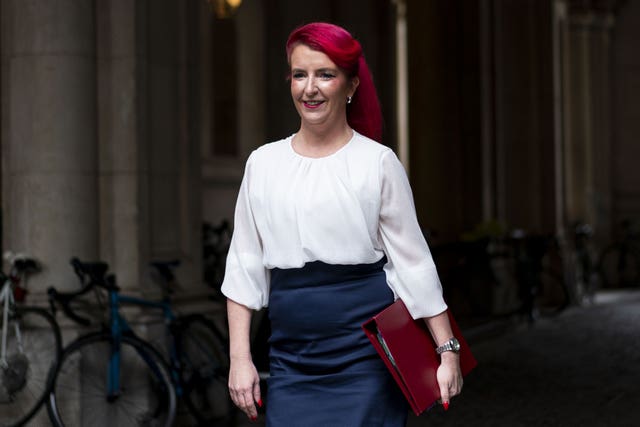Employers must be stopped from using non-disclosure agreements, says ex-minister
Labour former minister Louise Haigh argued that employers cannot be trusted with this ‘tool of oppression’.

A Labour former minister has called for an end to the “two-tier system of protection”, as she pressed the Government to remove the ability of employers to use non-disclosure agreements (NDAs).
Louise Haigh raised concerns that low-paid workers are being legally silenced and argued employers cannot be “trusted” with this “tool of oppression”.
The MP for Sheffield Heeley previously attempted to amend the Employment Rights Bill to include powers to prohibit the use of NDAs in cases of sexual harassment or abuse.

Speaking in Westminster Hall, Ms Haigh said: “This issue overwhelmingly affects women, it overwhelmingly, as I say, affects low-income workers, it affects all vulnerable people, particularly disabled people and people of colour.”
She added: “We have to address it in order to help fulfil our mission to tackle violence against women and girls but we also need to be careful that we do not narrow this definition down to sexual harassment, as it cover all kinds of abuse in the workplace.
“And quite simply, we need to remove this tool completely from employers.
“Because it is only those with the means and the confidence to pursue their employers through the courts who can challenge these practices.
“Low-paid workers in hospitality or retail are being legally silenced after they have suffered serious harm, and they have no access to redress.
“I want to stress here that I do not think 100% of hospitality businesses are bad employers or that the sector is packed full of people who set out to silence victims after they have been abused or discriminated against.
“The point is that these clauses have become boilerplate. They are signed unwittingly by workers and, in many cases, required unwittingly by employers with little or no understanding of the consequences.
“It has become standard practice to include these broadly drafted confidentiality clauses in contracts that go far further than is required to protect commercial confidentiality or trade secrets.”
Ms Haigh warned the UK could become an “outlier” as she pointed to Ireland and America as examples of countries which have legislated to ban certain uses of NDAs.
Ms Haigh added: “In May 2024, the Victims and Prisoners Bill was amended to make it clear that any confidentiality agreement is void if it precludes a victim from speaking to legal, therapeutic advice services, or family when it is related to criminal conduct.
“And the Higher Education (Freedom of Speech) Bill was also amended to prohibit NDAs being used in cases of sexual harassment, discrimination and bullying.
“So we now have the absurd situation where students and workers in universities are protected but a cleaner, who works on a university campus but for an outsourced company, would not enjoy those same protections.
“We have created a two-tier system of protection, so what is the possible justification for denying workers outside the higher education system that same level of protection?”

Ms Haigh said NDAs are a “tool of oppression”, adding: “We have to accept that it is a serious problem in every type of workplace in this country and that employers simply cannot be trusted with this tool at their disposal.”
Directing her final comments to the minister, Ms Haigh said: “What else does he or his department need to be satisfied on the need to legislate?
“How much longer must low-paid workers be legally required to suffer in complete silence before we can be persuaded to take the necessary legal steps?”
During the debate on the use of NDAs in civil harassment, discrimination and abuse cases, Labour MP Sarah Owen said NDAs “protect a culture of wrongdoing”.
She said around 435,000 pregnant women and mothers in the UK have signed NDAs, and 80% of those felt they had to either leave their job or cut their hours as a result of the NDA.
The MP for Luton North also raised concerns for women working in the classical music industry who had been asked to conduct sexual favours “in order to get the first positions”.
Earlier in the debate, Martin Wrigley, Liberal Democrat MP for Newton Abbot, urged the Government to ban the use of NDAs within the NHS.
Liberal Democrat justice spokesperson Josh Babarinde argued the purpose of an NDA is “to protect the identity of the 11 spices that KFC use in their chicken, and not to protect sex pests”.
Shadow business minister Greg Smith said the Government should “lead by example”, as he asked: “How many non-disclosure agreements have been used across the civil service since the Government took office last July?”
Business minister Justin Madders said he recognised that NDAs are “important and need looking at” and he is “happy to work with members”.
He told MPs: “There are, I think, a whole range of issues that we need to consider about how we get this right.
“For example, as we’ve heard, the use in various sectors, whether some sectors need particular protections, such as the creative industries.”
He added: “We need to make sure that any work we do does not create a new loophole, a new way, for these clever lawyers to exploit, so it is future-proofed as much as possible.
“We also need to ensure that any legislation includes an option for a victim to freely choose to have an NDA if that is what they want, without pressure.”
Mr Madders said a “cultural shift in employers” is needed, adding: “Legislation can say everything it wants, but unless we get employers to really begin to tackle those who are perpetrating these terrible acts, rather than protecting them, then we will continue to have these things being debated.”
In response to Mr Smith, Mr Madders said he would check if the civil service uses NDAs.





